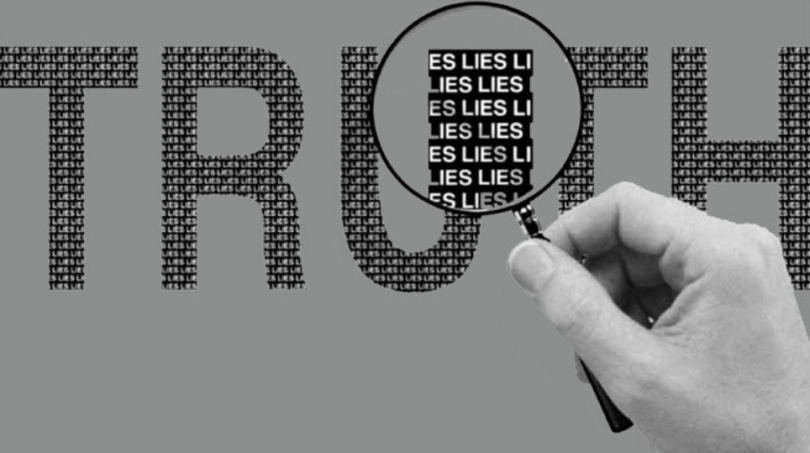This is part six of our paramedia series, our ongoing investigation into the fake news invasion . Read the whole series here. -Ed.
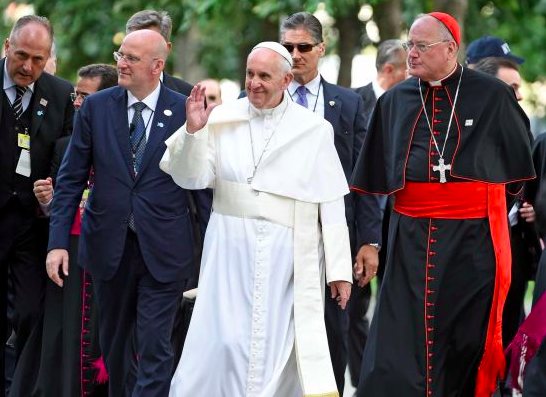 By Larry Press and Gina Smith
By Larry Press and Gina Smith
aNewDomain — I was surfing the talk radio shows on the long drive home yesterday when the words “Donald Trump” and “Pope” — in the same sentence — stopped me cold.
The speaker turned out to be a nun, a talk show host on a station my car stereo’s screen identified as Catholic Radio. The nun was in the middle of telling a caller that, yes, of course she knew Trump wasn’t perfect when she voted for him. But all she was looking for was a a pro-life candidate, after all.
The caller asked if Sister Claire¹ wasn’t concerned that Trump, a pro-choice supporter for 25 years before the election, wouldn’t just flip-flop back to that stance after the inauguration.
No way, said the nun. She was putting her faith, not so much in Trump, but in Pope Francis.
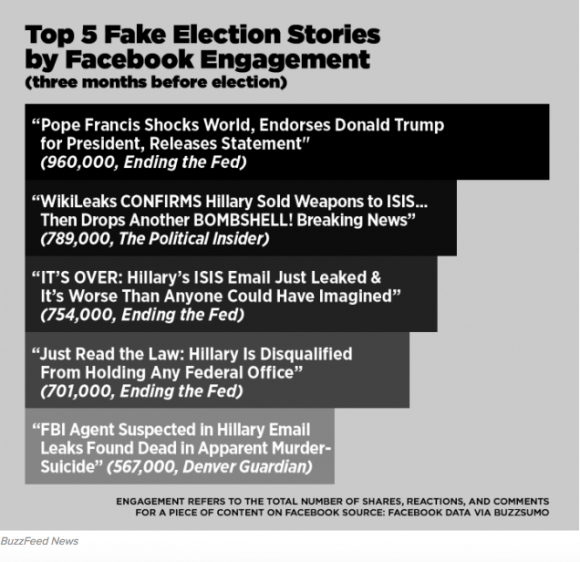 “He is no dummy,” she told the caller. “Just the fact that His Holiness would actually come out and endorse Trump” is important … (and) it was a real first.”
“He is no dummy,” she told the caller. “Just the fact that His Holiness would actually come out and endorse Trump” is important … (and) it was a real first.”
“Because I am sure the Pope has never endorsed anyone in all the decades I’ve been voting.” With that, the sister headed into the next commercial break.
Yes, sister, he hasn’t. He still hasn’t.
Chock up another one win for fake news and the paramedia sites behind it all.
Did fake news help swing the election?
The fake Pope-Trump endorsement piece was the most-shared fake news story of the presidential election cycle, according to a deep dive Buzzfeed investigation this week. And it didn’t just trick elderly nuns and their radio fans either.
According to that analysis, the story originated on an unreliable site, EndTheFed, and it was shared, liked and commented on 960,000 times on Facebook.
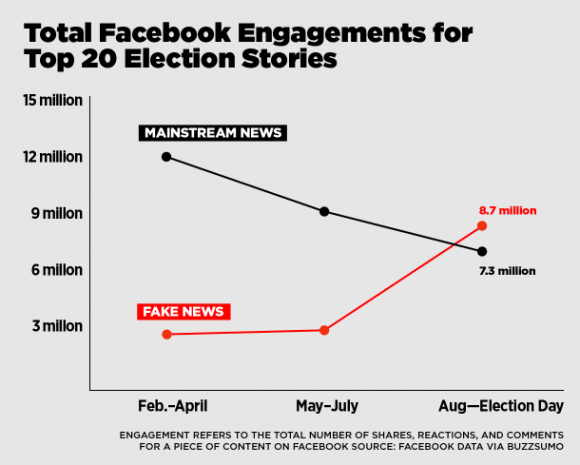 That’s not counting another million Facebook engagements for the some two dozen other fake news and satire sites who posted versions of that story, according to numbers we derived on SharedCount.
That’s not counting another million Facebook engagements for the some two dozen other fake news and satire sites who posted versions of that story, according to numbers we derived on SharedCount.
Some 8.7 million people engaged with fake news on Facebook since February 2016, compared with the 7.4 million who liked, shared and commented on real news stories from credible media outlets, Buzzfeed’s researchers concluded.
Who’s responsible for spreading fake news? Who can be held accountable?
You could blame Facebook, Twitter and so on. They provide the platform for this editorial garbage dump. But aside from announcing plans to suspend ad deals and block troll accounts and haters, they so far are unwilling to own up to the problem and stop the madness.
And don’t expect geeks to come to rescue by building apps to block fake news purveyors …
Too bad we can’t ask ICANN
Unfortunately, current ICANN domain name rules let even corporations hide their identities in publicly-available site registration logs.
To point: I ran a WhoIs query on a site called”WTOE 5 News, one of three dozen sites I located that pushed a popular version of the faked Pope story on Facebook. This site’s Pope pice alone got nabbed some 70,000 Facebook engagements.
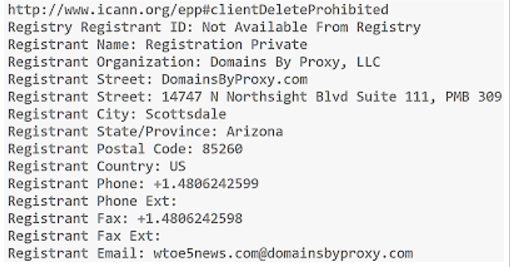 As you can see, below, the registrar listed is DomainsByProxy.com. You can can see the address, contact information and names of people at that organization, but not the identity of the person or organization who registered the URL. That’s secret.
As you can see, below, the registrar listed is DomainsByProxy.com. You can can see the address, contact information and names of people at that organization, but not the identity of the person or organization who registered the URL. That’s secret.
It’s true that a skeptical, curious person could’ve just looked at the WTOE5 News site to find lots of political attack stories against both Trump and Hillary Clinton. And a quick check of its About Page would’ve confirmed the site is just a “fantasy news site.” Alternatively a Google search would’ve surfaced the many debunkings from that appear in reliable fact-checking sites like Politifact, FactCheck.org and Snopes.
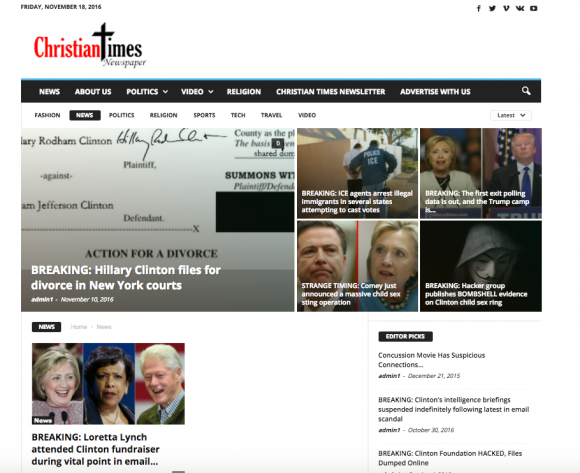 But that takes more work than most of the minions responsible for helping to broadcast fake news seem willing to do.
But that takes more work than most of the minions responsible for helping to broadcast fake news seem willing to do.
And if you ever wanted to work up a case against someone for purposely rigging an election, just as an example, you need a real person to hang it on. But hold that thought.
The key thing to note here is that WTOE5 is one of the good guys, one of the few fake news outlets that actually identifies itself as making fake news.
The vast majority of others, according to more than a hundred Snopes fake news debunkings we examined, have no such label.
Consider the ironically named “Christian Times Newspaper.” On Nov. 9, the day after the election, it ran this whopper of a headline: Breaking News: Hillary Clinton Filed for Divorce in New York Courts.
It went viral almost immediately, judging from our SharedCount search on the URL.
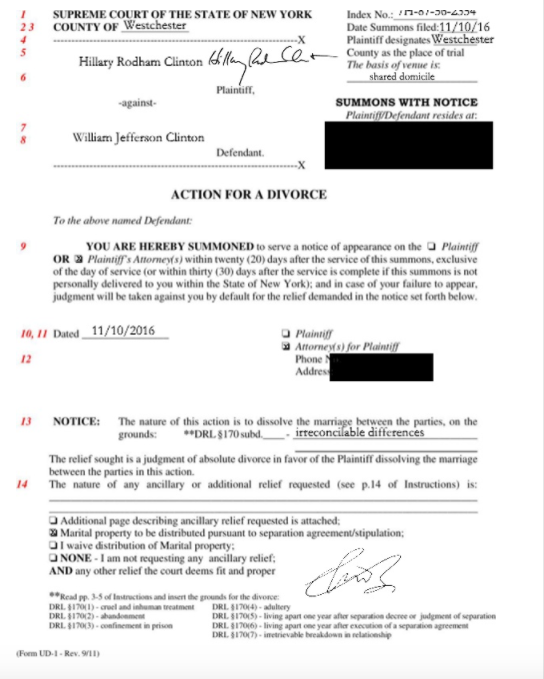 Its only evidence to back this claim: an image of a divorce summons from Hillary Clinton to Bill (below).
Its only evidence to back this claim: an image of a divorce summons from Hillary Clinton to Bill (below).
So who are these guys?
Well, Christian Times‘ About page says it is a “premier online source for news” that is based in Nairobi, Kenya. It says nothing — zero – about satire.
And a WhoIs search also revealed nothing, Kenyan, American or otherwise.
All you find the same registrar that was behind the WTOE5 news site, DomainsByProxy.com.
And the registration? That’s confidential.
Desperate times and measures
I understand the wish to protect the privacy of a person or organization registering a domain name. That’s why privacy advocates flipped out so hard when ICANN suggested, back in 2015, that it just wanted to take comments on the matter. Earlier this year, the organization affirmed its decision to protect the identities of those who wished to remain unnamed, saying it was in the public interest to do so.
Clearly we have new data to consider here.
There is an indisputable public interest in discouraging sites that exist to trick huge numbers of Americans into behaving or believing fake news and conspiracy theories.
In fact, it may well be the collective Internet’s responsibility to stop them.
But without real name domain registration, how do you even do that?
Now, I am not a lawyer, but I suspect that just trying to get a court to take up a case against a long list of people who legally hid their names would be ridiculously hard.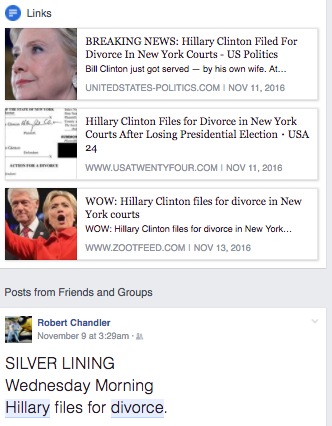
It’s not true that lies intended to mislead people for personal gain are protected by the First Amendment, you know. It’s possible someone crafty could go after someone for advertising, we hear from our lawyers, but to go after anyone you need to know who that anyone is.
A verifiable, real-names policy for domain registration, at the very least, would discourage this sort of thing.
Own Your Own Words
The WELL, an early community bulletin board system in pre-Web days, adopted such a policy back in the 1980s. Its slogan — “own your own words” — was remarkably prescient.
By shining a light on the situation, it keeps discussion civil, blot out bullying, lying and so on. And as everyone knows, criminals hate the light.
It might be tough to talk Internet privacy advocates into the move — they seriously fear the safety of individuals online and want to protect their safety from those who would go after them.
But Trump supporters should be amenable to a real names domain policy. This is the same group, remember, who worried so vocally about voter fraud during the election cycle, while also advocating strict requirements for proof of identity and residence.
Voter fraud is exceedingly rare, of course. But fake news? It’s epidemic. Evidence of demonstrably fraudulent political information on the Internet is huge and mounti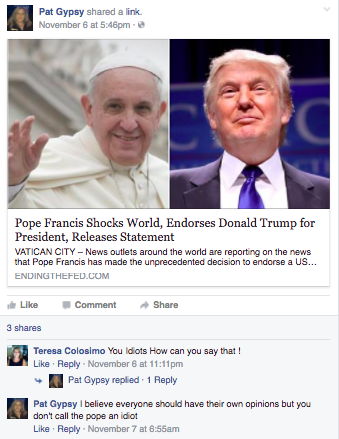 ng daily. If those who fear vote rigging really have genuine concerns, they should support a real-names policy for domain registration, too.
ng daily. If those who fear vote rigging really have genuine concerns, they should support a real-names policy for domain registration, too.
You know, the dirty tricks during this election remind me of the Watergate burglary that forced Pres. Richard M. Nixon to resign back in 1974. Unlike Watergate, however, it’s not clear what laws are being broken, who is breaking them and what the connections are between the most aggressive fake news purveyors and key influencers in either party.
We really need to know what’s going on here. ICANN needs to reopen its discussion on the matter.
I suppose that if ICANN refuses to put a real-names policy in place, someone might choose to follow the example of the hackers who stole information from the Democratic National Committee and just steal the registrar information.
Maybe Julian Assange, when he gets tired of helping out Russia, would even distribute the results on WikiLeaks.
We’d love to hear your thoughts.
For aNewDomain, this is Larry Press and Gina Smith reporting.

